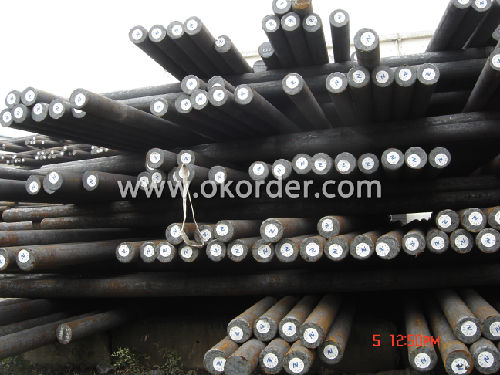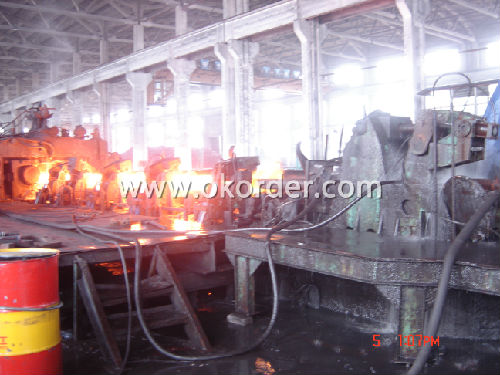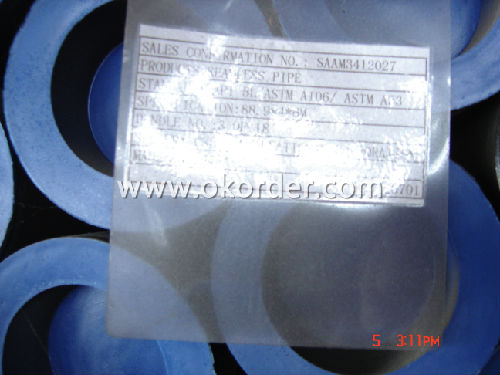API 5L Line Pipes
- Loading Port:
- China Main Port
- Payment Terms:
- TT or L/C
- Min Order Qty:
- 50MT m.t.
- Supply Capability:
- Based on order m.t./month
OKorder Service Pledge
OKorder Financial Service
You Might Also Like
API 5L Line Pipes
Application of API 5L Line Pipes:
It is widely applied to line pipe and casing and tubing in oil transportation and casing field, and it is used in Low,high pressure liquid and gassy transportation and it is also good Structure pipe (for furniture, window, door, building , bridge, mechanical etc).
Package of API 5L Line Pipes:
Bundles with anti-rust painting and with plastic caps
Standard of API 5L Line Pipes:
API SPEC 5L, API SPEC 5CT, ASTM A53, GB/T9711.1
Steel Grade of API 5L Line Pipes:
API SPEC 5L: B, X42, X46, X52, X56, X60, X65
API SPEC 5CT: J55, K55, N80, L80-1
ASTM A53: A, B, C
GB/T9711.1:L242、L290、L320、L360、L390、L415、L450
Sizes of pipes of API 5L Line Pipes:
*Remark: Besides below sizes, we also can arrange production based on requirement of customers
OD | WT | WEIGHT | ||||
INCH | MM | SCH | MM | INCH | KG/M | LB/INCH |
1 1/2” | 48.3 | STD-40 | 3.68 | 0.145 | 4.09 | 2.75 |
1 1/2” | 48.3 | XS-80 | 5.08 | 0.2 | 5.47 | 3.68 |
2” | 60.3 | STD-40 | 3.91 | 0.154 | 5.49 | 3.69 |
2” | 60.3 | XS-80 | 5.54 | 0.218 | 7.56 | 5.08 |
2 1/2” | 73 | STD-40 | 5.16 | 0.203 | 8.72 | 5.86 |
2 1/2” | 73 | XS-80 | 7.01 | 0.276 | 11.52 | 7.74 |
3” | 88.9 | STD-40 | 5.49 | 0.216 | 11.41 | 7.67 |
3” | 88.9 | XS-80 | 7.62 | 0.3 | 15.43 | 10.37 |
3 1/2” | 101.6 | STD-40 | 5.74 | 0.226 | 13.71 | 9.21 |
3 1/2” | 101.6 | XS-80 | 8.08 | 0.318 | 18.83 | 12.65 |
4” | 114.3 | STD-40 | 6.02 | 0.237 | 16.24 | 10.91 |
4” | 114.3 | XS-80 | 8.56 | 0.337 | 22.55 | 15.15 |
5” | 141.3 | STD-40 | 6.55 | 0.258 | 21.99 | 14.78 |
5” | 141.3 | XS-80 | 9.53 | 0.375 | 31.28 | 21.02 |
6” | 168.3 | STD-40 | 7.11 | 0.28 | 28.55 | 19.19 |
6” | 168.3 | XS-80 | 10.97 | 0.432 | 42.99 | 28.89 |
8” | 219.1 | STD-40 | 8.18 | 0.322 | 42.98 | 28.88 |
8” | 219.1 | XS-80 | 12.7 | 0.5 | 65.3 | 43.88 |
10” | 273 | STD-40 | 9.27 | 0.365 | 60.9 | 40.92 |
10” | 273 | 80 | 15.09 | 0.594 | 96.95 | 65.15 |
12” | 323.8 | STD | 9.53 | 0.375 | 74.61 | 50.13 |
12” | 323.8 | 40 | 10.31 | 0.406 | 80.51 | 54.1 |
12” | 323.8 | XS | 12.7 | 0.5 | 98.42 | 66.14 |
12” | 323.8 | 80 | 17.48 | 0.688 | 133.38 | 89.63 |
14” | 355.6 | 40 | 11.13 | 0.438 | 95.51 | 64.18 |
14” | 355.6 | XS | 12.7 | 0.5 | 108.48 | 72.9 |
14” | 355.6 | 80 | 19.05 | 0.75 | 159.71 | 107.32 |
16” | 406.4 | XS-40 | 12.7 | 0.5 | 124.55 | 83.69 |
18” | 457 | STD | 9.53 | 0.375 | 106.23 | 71.38 |
18” | 457 | 40 | 14.27 | 0.562 | 157.38 | 105.75 |
18” | 457 | 80 | 23.83 | 0.938 | 257.13 | 172.78 |
20” | 508 | 40 | 15.09 | 0.594 | 185.28 | 124.5 |
20” | 508 | 80 | 26.19 | 1.031 | 314.33 | 211.22 |
Raw Materials



- Q:How are steel pipes protected against fire hazards?
- Steel pipes are protected against fire hazards through various methods such as fire-resistant coatings, fire wraps, or fireproof cladding. These protective measures prevent the pipes from being exposed to high temperatures and flames, ensuring their structural integrity and reducing the risk of fire-related incidents.
- Q:How do you determine the wall thickness of a steel pipe?
- To determine the wall thickness of a steel pipe, there are a few methods you can use. The most common and accurate method is to measure it using a caliper or micrometer. First, ensure that the pipe is clean and free from any debris or rust. Then, take the caliper or micrometer and gently place it around the circumference of the pipe, making sure it is perpendicular to the surface. Carefully close the jaws of the measuring tool until they are snug against the pipe, but not so tight that they deform the shape. Once the jaws are closed, read the measurement displayed on the tool. This measurement represents the distance between the inner and outer diameter of the pipe, which is equal to the wall thickness. Alternatively, if you don't have access to a caliper or micrometer, you can use a pipe wall thickness gauge. These gauges have a set of pins or rollers that can be inserted into the pipe, providing you with an accurate measurement. Simply insert the pins into the pipe, ensuring they are properly aligned with the wall, and check the reading displayed on the gauge. It's important to note that when measuring the wall thickness of a steel pipe, you should take multiple readings at different points along the pipe to account for any variations. This will provide you with a more accurate average measurement.
- Q:Can steel pipes be used for petrochemical plants?
- Yes, steel pipes can be used for petrochemical plants. Steel pipes are often preferred in petrochemical plants due to their high strength, durability, and resistance to corrosion, making them ideal for handling various chemicals and substances involved in petrochemical processes. Additionally, steel pipes can withstand high pressure and temperature conditions commonly encountered in petrochemical plants, making them a reliable choice for transporting fluids and gases.
- Q:What is the difference between steel pipes and cast iron pipes?
- The main difference between steel pipes and cast iron pipes lies in their composition and properties. Steel pipes are made from an alloy of iron and carbon, which gives them high strength and durability. They are also resistant to corrosion and can withstand high pressure and temperature conditions. On the other hand, cast iron pipes are made from molten iron, which provides them with excellent soundproofing capabilities and resistance to fire. However, cast iron pipes are more prone to corrosion and can be brittle, making them less suitable for high-pressure applications.
- Q:Are steel pipes recyclable?
- Yes, steel pipes are highly recyclable. They can be melted down and repurposed into new steel products without losing their quality or strength. Recycling steel pipes not only conserves natural resources but also reduces energy consumption and greenhouse gas emissions associated with steel production.
- Q:What is the difference between the stainless steel pipe welded pipe and seamless pipe?
- Welding performance: chemical composition of seamed pipe and seamless pipe are different. The production of seamless steel components only meets the basic requirements of astm. The production of seamed tube steel containing suitable for chemical composition of welding. For example, the mixing of silicon, sulfur, manganese, oxygen, and a certain proportion of elements such as the triangle ferrite can produce a welding flux which is easy to transfer heat during welding, so as to make the whole weld be welded well. The lack of steel pipe above the chemical components, such as seamless tube, can produce all kinds of unstable factors in the process of welding, welding and welding penetration is not easy.
- Q:Are steel pipes suitable for use in food processing industries?
- Yes, steel pipes are suitable for use in food processing industries. They are highly durable, corrosion-resistant, and can withstand high temperatures and pressure. Additionally, steel pipes are easy to clean, maintain hygiene standards, and do not contaminate the food being processed.
- Q:How are steel pipes used in the petrochemical industry?
- Steel pipes are widely used in the petrochemical industry for transporting and distributing various fluids and gases. They are particularly valuable for their durability, strength, and resistance to corrosion, which is crucial when dealing with highly corrosive substances. Steel pipes are employed in various processes such as refining, oil and gas production, chemical manufacturing, and transportation of petrochemical products. Whether it's conveying raw materials, transferring processed products, or supporting infrastructure, steel pipes play a vital role in ensuring the safe and efficient operation of the petrochemical industry.
- Q:Can steel pipes be used for the construction of transmission towers?
- Yes, steel pipes can be used for the construction of transmission towers. Steel pipes are commonly used in the construction industry due to their strength, durability, and ability to withstand various weather conditions. They provide a reliable and cost-effective solution for supporting the weight and load of transmission towers, making them suitable for this purpose.
- Q:Are steel pipes resistant to corrosion?
- Yes, steel pipes are resistant to corrosion due to the protective layer formed by the oxide film on their surface. However, their resistance can vary depending on the specific type of steel and the conditions they are exposed to.
1. Manufacturer Overview |
|
|---|---|
| Location | Tianjin, China |
| Year Established | 2004 |
| Annual Output Value | 250,000Tons |
| Main Markets | Europe; South America; Americas;etc. |
| Company Certifications | API 5L;API 5CT;ISO 9001:2008 GB/T 19001-2008;ISO 9001:2008 |
2. Manufacturer Certificates |
|
|---|---|
| a) Certification Name | |
| Range | |
| Reference | |
| Validity Period | |
3. Manufacturer Capability |
|
|---|---|
| a)Trade Capacity | |
| Nearest Port | Tianjin |
| Export Percentage | 50% - 60% |
| No.of Employees in Trade Department | 1000-2000 People |
| Language Spoken: | English; Chinese; Spanish |
| b)Factory Information | |
| Factory Size: | Above 70,000 square meters |
| No. of Production Lines | Above 8 |
| Contract Manufacturing | OEM Service Offered; Design Service Offered |
| Product Price Range | Average |
Send your message to us
API 5L Line Pipes
- Loading Port:
- China Main Port
- Payment Terms:
- TT or L/C
- Min Order Qty:
- 50MT m.t.
- Supply Capability:
- Based on order m.t./month
OKorder Service Pledge
OKorder Financial Service
Similar products
New products
Hot products
Related keywords






























